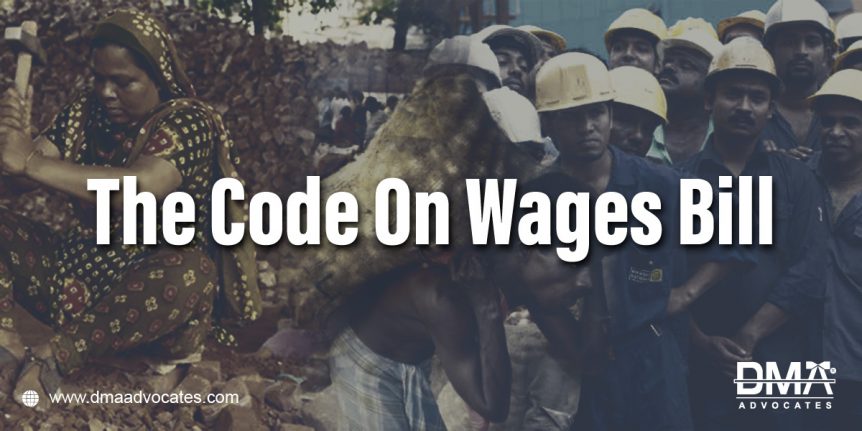The code on wages bill of 2019 has been considered a historic one aiming at transforming the obsolete and out dated Labour laws in to more genuine and transparent one. This law of 2019 is more accountable and it has been framed keeping in mind the current needs.
The previous Labour laws like for example, The Payment of Wages Act, 1936, The Minimum Wages Act, 1948, The Payment of Bonus Act, 1965 and The Equal Remuneration Act, 1976 do not define the need of the hour and has been replaced by The Code on Wages Bill, 2019. The not worthy factors of these acts have been subsumed in The Code on Wages Bill, 2019.
The Primary focus of the Code is well-being and humane working conditions of the labours, and guaranteeing minimum wages along with timely payment of wages to all the employees and workers.
The employees or the workers of many unorganized sectors including agriculture, dhabas, restaurants, painters, watch mans, drivers etc., will be provided with legislative protection, after the bill becomes act.
The Code on Wages Bill, 2019 has been passed in the Parliament on the 4th Of August, 2019. This bill seeks at the regulation of the wages and the bonus payments in all the employments where any industry, trade, manufacturing or business is carried out.
FEATURES OF THE BILL
Coverage:
The Code will be applicable to all employees. The wage-related decisions for employments such as railways, mines, and oil fields, among others shall be taken care by the Central Government of India. All the State governments would be taking care of all the other employments.
The Wages include salary, allowance, or any other component expressed in monetary terms. Wages does not include bonus payable to employees or any travel allowance, among others.
Floor wage:
According to the Code, the central government will fix a floor wage, taking into account living standards of workers. Further, it may set different floor wages for different geographical areas. Before fixing the floor wage, the central government may obtain the advice of the Central Advisory Board and may consult with state governments.
Fixing the minimum wage:
The Code prohibits employers from paying wages less than the minimum wages. Minimum wages will be notified by the central or state governments. This will be based on time, or number of pieces produced. The minimum wages will be revised and reviewed by the central or state governments at an interval of not more than five years. While fixing minimum wages, the central or state governments may take into account factors such as: (i) skill of workers, and (ii) difficulty of work.
Overtime:
The central or state government may fix the number of hours that constitute a normal working day. In case employees work in excess of a normal working day, they will be entitled to overtime wage, which must be at least twice the normal rate of wages.
Payment of wages:
Wages will be paid in
(i) coins,
(ii) currency notes,
(iii) by cheque,
(iv) by crediting to the bank account, or
(v) through electronic mode.
The wage period will be fixed by the employer as either: (i) daily, (ii) weekly, (iii) fortnightly, or (iv) monthly.
Deductions:
Under the Code, an employee’s wages may be deducted on certain grounds including:
(i) fines,
(ii) absence from duty,
(iii) accommodation given by the employer, or (iv)recovery of advances given to the employee, among others.
These deductions should not exceed 50% of the employee’s total wage.
Determination of bonus:
All employees whose wages do not exceed a specific monthly amount, notified by the central or state government, will be entitled to an annual bonus. The bonus will be at least:
(i) 8.33% of his wages,
or (ii) Rs 100, whichever is higher.
In addition, the employer will distribute a part of the gross profits amongst the employees. This will be distributed in proportion to the annual wages of an employee. An employee can receive a maximum bonus of 20% of his annual wages.
Gender discrimination:
The Code prohibits gender discrimination in matters related to wages and recruitment of employees for the same work or work of similar nature. Work of similar nature is defined as work for which the skill, effort, experience, and responsibility required are the same.
Advisory boards:
The central and state governments will constitute advisory boards. The Central Advisory Board will consist of:
(i) employers,
(ii) employees (in equal number as employers),
(iii) independent persons, and
(iv) five representatives of state governments.
State Advisory Boards will consist of employers, employees, and independent persons. Further, one-third of the total members on both the central and state Boards will be women. The Boards will advise the respective governments on various issues including:
(i) fixation of minimum wages, and
(ii) increasing employment opportunities for women.
Offences:
The Code specifies penalties for offences committed by an employer, such as (i) paying less than the due wages, or (ii) for contravening any provision of the Code. Penalties vary depending on the nature of offence, with the maximum penalty being imprisonment for three months along with a fine of up to one lakh rupees.
Therefore, The Code on Wages Bill, 2019 seeks betterment and development in the employment conditions, working conditions and payments of the workers. It aims at providing justice in the payments to all the employee’s and the workers of all organizations and promotes wellbeing and growth.


